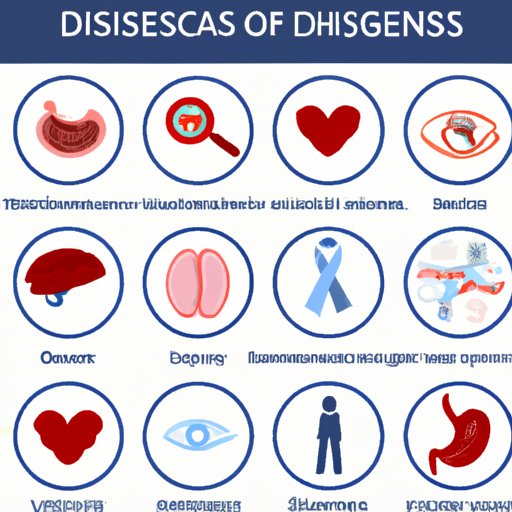
I. Introduction
Whether it’s a common cold or a chronic illness, diseases can have a significant impact on our lives. Understanding diseases, including their causes and symptoms, is important for our overall health and wellness. In this article, we will explore the basics of disease, how they develop, different types of illnesses, and preventative measures. We will also discuss coping with chronic diseases and recent advancements in medical research and technology related to disease control.
II. The Basics of Disease: Understanding the Causes and Symptoms
A disease is a medical condition that interferes with the normal functioning of the body and causes physical or mental discomfort. Various factors can lead to the development of a disease, including genetics, environmental factors, and lifestyle choices. Common symptoms of diseases include fever, fatigue, pain, and inflammation.
III. A Comprehensive Guide to Different Types of Diseases and Their Effects
Diseases can be classified into various categories. Infectious diseases are caused by pathogens such as bacteria, viruses, and fungi, and can spread from person to person. Non-communicable diseases, on the other hand, are typically caused by lifestyle factors such as diet, exercise, and smoking. Examples of common infectious diseases include influenza, measles, and HIV/AIDS, while non-communicable diseases include diabetes, cancer, and heart disease. The effects of diseases vary depending on the type of illness and the severity of the condition, but can include physical limitations, mental health concerns, and social challenges.
IV. The Science of Diseases: How They Develop and Spread
Diseases develop when the body’s natural defenses are compromised by genetic or environmental factors such as exposure to toxins or a weakened immune system. Disease can spread in various ways, including through the air, contaminated water or food, and direct contact with an infected person. Preventative measures such as vaccination, hygiene, and avoiding high-risk behaviors play a crucial role in the control and spread of diseases.
V. Coping with Chronic Diseases: Tips on Managing and Improving Quality of Life
Chronic diseases, which are long-term medical conditions, can be particularly challenging. Individuals with chronic illnesses often face physical limitations, mental health concerns, and social isolation. However, there are tips for managing and improving quality of life, including regular exercise, a healthy diet, and connecting with support systems such as family, friends, and healthcare providers.
VI. Preventing the Spread of Diseases: Best Practices for Staying Healthy
Preventative measures are crucial for staying healthy and preventing the spread of diseases. These include vaccination, handwashing, safe sex practices, and healthy lifestyle habits such as regular exercise, getting enough sleep, and avoiding high-risk behaviors such as smoking and drug use. Additionally, following specific tips for avoiding infectious diseases such as COVID-19 can help protect yourself and others.

VII. The Future of Disease Control: Advancements in Research and Technology
Medical research and technology are constantly evolving, leading to advancements in disease control and prevention. Recent developments such as gene editing and artificial intelligence have the potential to revolutionize the way we diagnose and treat illnesses. Staying informed on the latest developments in disease control is crucial for both healthcare providers and individuals seeking to take control of their health.
VIII. Conclusion
Diseases can have a significant impact on our lives, but understanding how they develop and spread, different types of illnesses, and preventative measures can help improve our overall health and wellness. Coping with chronic diseases and preventing the spread of illnesses are key components of staying healthy. Advancements in medical research and technology offer hope for the future of disease control and prevention. By taking proactive steps to care for our health and staying informed, we can continue to learn and grow in our understanding of diseases.




